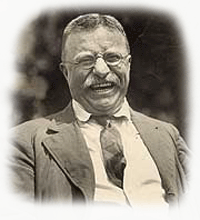What College Graduates Owe America
 HT to Armed Liberal concerning Teddy Roosevelt's description of the duties of college educated people. (Unfortunately, TR did not use inclusive language, so I would assume his words would wash right over some people today.)
HT to Armed Liberal concerning Teddy Roosevelt's description of the duties of college educated people. (Unfortunately, TR did not use inclusive language, so I would assume his words would wash right over some people today.)In The Atlantic in 1894, Teddy Roosevelt - wealthy Harvard man - wrote this:
What College Graduates Owe America
August 1894
It is proper to demand more from the man with exceptional advantages than from the man without them. A heavy moral obligation rests upon the man of means and upon the man of education to do their full duty by their country. On no class does this obligation rest more heavily than upon the men with a collegiate education, the men who are graduates of our universities. Their education gives them no right to feel the least superiority over any of their fellow-citizens; but it certainly ought to make them feel that they should stand foremost in the honorable effort to serve the whole public by doing their duty as Americans in the body politic …
To the great body of men who have had exceptional advantages in the way of educational facilities we have a right, then, to look for good service to the state. The service may be rendered in many different ways. In a reasonable number of cases, the man may himself rise to high political position. That men actually do so rise is shown by the number of graduates of Harvard, Yale, and our other universities who are now taking a prominent part in public life. These cases must necessarily, however, form but a small part of the whole. The enormous majority of our educated men have to make their own living, and are obliged to take up careers in which they must work heart and soul to succeed. Nevertheless, the man of business and the man of science, the doctor of divinity and the doctor of law, the architect, the engineer, and the writer, all alike owe a positive duty to the community, the neglect of which they cannot excuse on any plea of their private affairs. They are bound to follow understandingly the course of public events; they are bound to try to estimate and form judgment upon public men; and they are bound to act intelligently and effectively in support of the principles which they deem to be right and for the best interests of the country …
For educated men of weak fibre, there lies a real danger in that species of literary work which appeals to their cultivated senses because of its scholarly and pleasant tone, but which enjoins as the proper attitude to assume in public life one of mere criticism and negation; which teaches the adoption toward public men and public affairs of that sneering tone which so surely denotes a mean and small mind. If a man does not have belief and enthusiasm, the chances are small indeed that he will ever do a man's work in the world …
Again, there is a certain tendency in college life … to make educated men shrink from contact with the rough people who do the world's work, and associate only with one another and with those who think as they do. This is a most dangerous tendency. It is very agreeable to deceive one's self into the belief that one is performing the whole duty of man by sitting at home in ease, doing nothing wrong, and confining one's participation in politics to conversations and meetings with men who have had the same training and look at things in the same way. It is always a temptation to do this, because those who do nothing else often speak as if in some way they deserved credit for their attitude, and as if they stood above their brethren who plough the rough fields …
This is a snare round which it behooves every young man to walk carefully. Let him beware of associating only with the people of his own caste and of his own little ways of political thought. Let him learn that he must deal with the mass of men; that he must go out and stand shoulder to shoulder with his friends of every rank, and face to face with his foes of every rank, and must bear himself well in the hurly-burly. He must not be frightened by the many unpleasant features of the contest, and he must not expect to have it all his own way, or to accomplish too much. He will meet with checks and make many mistakes; but if he perseveres, he will achieve a measure of success and will do a measure of good such as is never possible to the refined, cultivated, intellectual men who shrink aside from the actual fray …
[Above ellipses in the orginal - A.L.]
I loved the quote about "the proper attitude to assume in public life one of mere criticism and negation; which teaches the adoption toward public men and public affairs of that sneering tone which so surely denotes a mean and small mind."
I was also challenged by it. How much do I criticize, and how much do I do to help society become better? How many of my comments about the issues of the day are "sneering", as if I am morally superior to my colleagues and fellow citizens.
A good word from the former president. And a nice find from someone with whom I probably disagree politically, but here find some common ground.

0 Comments:
Post a Comment
<< Home